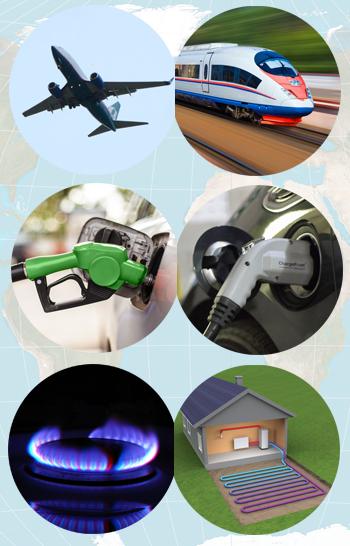 Which is the lowest carbon alternative? That may depend where you live.University of Toronto EngineeringWhether it's swapping your car for an electric vehicle, or your natural gas furnace for geothermal heating, transitioning from fossil fuels to electric-powered technology is widely believed to be the best way to lower carbon emissions.
Which is the lowest carbon alternative? That may depend where you live.University of Toronto EngineeringWhether it's swapping your car for an electric vehicle, or your natural gas furnace for geothermal heating, transitioning from fossil fuels to electric-powered technology is widely believed to be the best way to lower carbon emissions.
But according to University of Toronto (U of T) civil engineer Chris Kennedy, knowing where the electricity comes from to power those "eco-alternatives" is critical. If that electricity comes from burning oil and coal, it might mean that green alternatives aren't that green after all.
Kennedy's study, published in the journal Nature Climate Change, proposes a new decision-making threshold for when to move from fossil fuel technology to electric power (called electrification), and at what point that move may increase or lower carbon emissions.
Although regions may welcome "green" technology like electric vehicles, high-speed rail and geothermal heating, they aren't green if the electricity to power them creates even more carbon emissions than their oil-driven counterparts.
For electrification to lower emissions, Kennedy says that a region needs to produce its electricity at a rate below his threshold: approximately 600 tons of carbon dioxide equivalent per gigawatt hour (GWh). This means that for every gigawatt hour of electricity generated (the power needed to run about 100 homes for a year), less than 600 tons of greenhouses gases (measured as "CO2 equivalent") can be emitted.
If a region's electricity production exceeds this 600-ton threshold, such as in countries like India, Australia and China (as shown in Figure A), electrification could actually increase carbon emissions and accelerate climate change.
Countries such as these generate much of their electricity using coal, which he says produces about 1,000 tons of CO2 equivalent per GWh--nearly double the suggested threshold. Natural gas, on the other hand, produces 600 tons, and hydropower and nuclear energy produce nearly zero.
"You could speculate that incorporating electrified technologies such as high speed rail in China may not lower overall emissions," says Kennedy. "It might even be more carbon friendly to fly."
Kennedy employed an industrial ecology approach to dig into the data from four previous studies--including one from the International Energy Agency and others from Canada, the U.S. and countries in Europe.
As a nation, Canada's electricity does not produce very much carbon in comparison to other regions. It ranks low on the list, at just under 200 tons of CO2 equivalent per GWh. "Despite that many believe our power is generated using fossil fuels from Alberta, most of Canada's electricity mix comes from hydropower and nuclear facilities," Kennedy says.
But when he zoomed in on certain regions in Canada, some of this good news changed. In a previous study, he compared the use of "green" geothermal heat pumps (used in homes) versus natural gas furnaces across different provinces. He found that the pumps were more eco-friendly in Ontario and British Columbia--owing to nuclear and hydropower--but in coal-dependent Alberta, it was greener to stay with a natural gas furnace.
In his recent paper, Kennedy also cites a study that found using plug-in electric vehicles emitted less carbon when used along the west coast of the United States, but produced the same, if not more, carbon when used in the Midwestern U.S.
Why does this threshold matter?
"Looking at overall carbon emissions of one country or a group of countries can only get you so far," says civil engineering PhD student Lorraine Sugar (CivE MASc 1T0, PhD 1T8), who worked as a climate change specialist for the World Bank for nearly five years. "It's hard to track progress and set goals internationally, while holding regions accountable. Having a specific and measurable target like this threshold is incredibly important, especially leading into the United Nations Climate Change Conference in Paris later this year."
According to Kennedy, this threshold puts a marker down in a policy arena where none has existed before--and it isn't just valuable for government.
"It reframes part of the climate change debate by encouraging individuals around the world to better understand where their electricity is coming from before they adopt supposedly eco-friendly technologies," he says. "And even more, it incites them to understand how much carbon is emitted during the entire life cycle of those technologies--from their ongoing operation to their manufacture and disposal."
He recommends people search for their local government energy agencies to find out how electricity is generated. If it is largely coal, then electric-powered technologies like ground-source heat pumps or electric vehicles may not be the most eco-friendly alternatives. On the national and international stage, he hopes governments do the same research when developing environmental policies and incentives.
"Canada's three largest cities--Toronto, Montreal and Vancouver--have some of the lowest carbon emissions from electricity generation in the world," says Daniel Hoornweg, an associate professor at the University of Ontario Institute of Technology and a current U of T engineering PhD student.
"This threshold helps politicians make smarter energy decisions," says Hoornweg, who recently retired from the World Bank after nearly 20 years in the urban sector. "Why aren't we making better use of these advantages to electrify our transportation modes? And why are we so focused on one or two energy projects (like a pipeline) instead of working on a more comprehensive U.S.-Canada energy agreement that could better leverage our energy strengths?"













